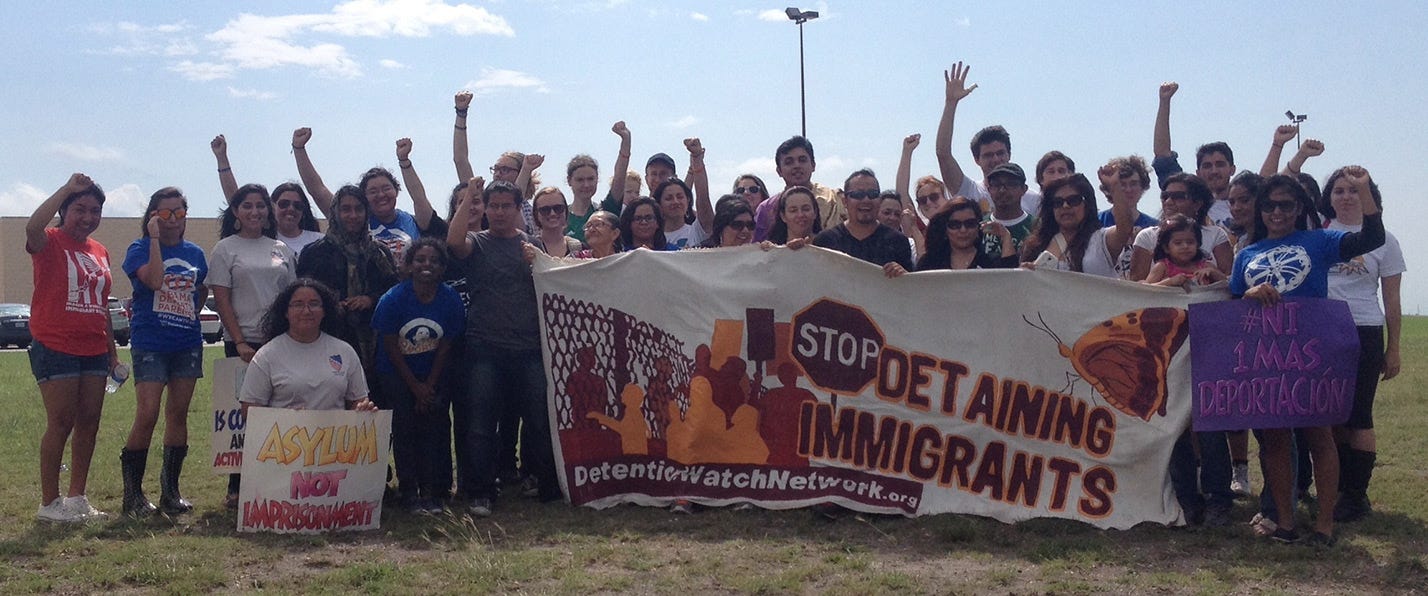“When I think about the thing that I'm fighting for, it’s giving people back their time. Their time to be human, their time to be in this world to thrive.”
Silky Shah on advocating for immigrant justice in perilous times.
This week we continue with the second part of our interview with Detention Watch Network director and author of Unbuild Walls, Silky Shah.
Here, Rita Kamani-Renedo and Antero Garcia talk with Silky about her work and the broader immigrant justice landscape in our current political context.
If you missed last week’s start to this conversation, you can find it here:
RITA KAMANI-RENEDO: Let’s talk about this election news cycle. On one level, a lot has changed since your book came out, on another level, not much has changed at all. Vice President Harris brags about her efforts at border militarization. The political discourse we’re hearing is significant. What lessons do you think that your book provides us for this moment?
SILKY SHAH: I think that we are in a really tough moment, and we've been there before. We have to recognize there have been really difficult times when draconian immigration policy was the name of the game. In the 90s after the passage of Proposition 187 in California, after the passage of the 1996 laws under Clinton… For me, thinking about that post-9/11 period and that really intense crackdown on immigrant communities—that actually ended up culminating in a response with some of the largest immigrant rights marches we had ever seen in 2006.
Or after SB 1070 in Arizona where again… it felt like, "Oh, it went that far." But actually there was a massive boycott of the state of Arizona. It was a real culmination of the immigrant youth movement taking agency for themselves and shifts started to take place.
RKR: Right, with these draconian shifts we saw movements boom.

SS: I think we have to keep all of those things in mind in a moment like this. We’re in a really tough moment, and it is hard to be hopeful about border policy in the context of this current administration— the Biden administration—and what could be if Harris were to be elected, and obviously what could be if Trump were to be reelected.
In terms of the lessons, the thing that I'm always trying to make really clear—and I think a lot of people miss this— is that the system of detention, of the deportation machine, of the prison industrial complex, was built by Democrats as much as it was built by Republicans. We have some room with the Democrats to move things, so we need to hold some line there. Unfortunately, what's often happened is that the Democrats, and also—from my perspective— the mainstream, well-resourced parts of the immigrant rights movement, have often ceded ground to try to get closer to the things that they want, but have made it that much harder to get to legalization. I write about that era of Comprehensive Immigration Reform and how much over the last 20+ years, things have moved even that much further to the right in an effort to get an immigration bill.
…the thing that I'm always trying to make really clear—and I think a lot of people miss this— is that the system of detention, of the deportation machine, of the prison industrial complex, was built by Democrats as much as it was built by Republicans.
RKR: Exactly, and now the conversation has totally shifted.
SS: What we're seeing is, in the Obama era, there was still this pretense of “we are fighting for legalization”, and “felons, not families;” the “grandmother, not the gang member,”—all of that. Now, that's not even in the conversation. The whole conversation is just border security. With Harris, there wasn't even a pretense of, "We're going to find some immigration relief for the people who are living here." Really, the narrative is just, "I'm a cop and I'm going to go after the border." It's really concerning.
I think it's important that we have had those wins, like DACA and extension of Temporary Protected Status. I think those combined with incredible efforts around sanctuary policy across the country, are the reason we don't have rampant deportations like we did, especially under Bush and Obama.
But that's starting to wane, and so the conversation I've been having with my colleagues and co-conspirators and the movement is “we have to go back to basics.” It's about political education, it's about know-your-rights, it's making sure people have the tools they need to protect themselves in their communities and then continue those efforts. It's sanctuary policy, and finding relief for more communities, and not falling into the comprehensive immigration reform trap that tells us we can get a little bit of good stuff for a lot of really bad stuff.
ANTERO GARCIA: When you talk about “ceding ground” is it to Republicans? To a general public?
SS: That's a good question. A few times I have said, "the Democrats have no vision," and I think a lot of people will respond "Well, their vision is just a neoliberal strategy." Their vision has been deterrence, deterrence, deterrence. I think that's true but the thing that they're not realizing is that their willingness to accept those frames actually gives more space to the Right and the Republicans.
So mostly when I talk about ceding ground, I'm talking about ceding ground to the Right, but the reality is, of course, prevention through deterrence started with Clinton. Obama was that era of secure communities and mass deportations. Biden was the border closures and the gutting of the asylum system. Those things are all true as well. There’s a real question of what happens next.
Now, Democrats have avoided immigration as much as possible or have taken on that more draconian deterrence approach. What they're not realizing is that by not holding onto some humanization of immigrants, not taking a more positive pro-immigrant vision actually just gives the Right more power.
I do think it's a bigger question though. It is a moment of real reckoning: What is the vision for the immigrant rights/immigrant justice movement, and therefore what is the vision that we're trying to push the Democrats or whoever is in power to shift towards?
AG: What keeps you hopeful in this moment?
SS: I think the thing that always keeps me hopeful is that I am fortunate enough to be a part of a network of people and organizations that understand the conditions and see what we're fighting, what we're up against, and are reading it well and are trying to find those interventions constantly—and have succeeded!
I mean, when I was writing the book, it was like, oh my gosh, we've actually won! We are starting to reduce detentions. We're winning our campaigns. I didn't know what it meant to win campaigns like that and then all of a sudden, it was happening!

Some 20 plus detention centers are no longer in use because of these local, state and federal level campaigns. It was really exciting! Now we're in this place that Biden is planning to expand five more detention centers. They want to get back to some of the Trump era rates of detention and deportation. It's really concerning to see.
But again, so many of these moments when things have gotten harsher are actually when movement grows and operates in different ways. So Detention Watch Network came to be after the passage of the 1996 laws. It was a response to that. So many organizations came together.
A lot of the statewide coalitions after 1986, when the Reagan "Amnesty Bill" was passed… a lot of organizations came together after 9/11. A lot of work and movement flourishes in response to these things and I don't doubt that is something that's going to be happening.
I think the challenge right now is that without that political education and because so much of the investment and resources on the immigrant rights fight has been focused solely on legalization and not really understanding all the other components—I mean, immigration is so intersectional! There's so many things, but because it's been so focused on that, that lack of vision is really hurting us. It feeds into some of the scarcity mindset and all the other things that lead to the fear mongering and scapegoating.
A lot of work and movement flourishes in response to these things and I don't doubt that is something that's going to be happening.
AG: This publication gets its name from the idea of the hidden costs of undocumented life in the U.S. If you could come up with a bill of what it costs to survive while undocumented in the US, what are the things you might put on it?
SS: Ruth Wilson Gilmore, a really important abolitionist scholar, talks about how much what is happening with incarceration is taking away people's time. That's what we have, that's who we are. Our time is everything, right?
So much of what happens with mass incarceration is that people lose time. People who are locked up for even a day, what does that mean? What does that do to somebody in terms of both their mental and physical wellbeing? How does that stay with them over time? For all those people who end up in detention—often two weeks, 30 days, sometimes months, sometimes years. So, if I were going to think about a bill, there's so many things we could say. But when I think about the thing that I'm fighting for, it’s giving people back their time. Their time to be human, their time to be in this world to thrive.
Propina & A note about elections
We will conclude our conversation with Silky Shah next week.
Considering we publish La Cuenta on Thursday mornings, Shah’s work at the intersection of abolition and immigrant justice will be as urgent as ever two days after next week’s U.S. election.
While most of our contributors are not able to vote in the upcoming election, La Cuenta is a testament to the civic capacities of all immigrants and of all people in this country. As we’ve written elsewhere, regardless of the election’s outcome, the landscape of anti-immigrant policies in this country pose a significant battle for us to fight for the foreseeable future.
Your civic ingenuity far exceeds whether you possess the capability to cast a ballot on one day of the year. If you have stories, poems, or pictures of civic action and advocacy, we’d love to share them here on La Cuenta.
We’ll see you next week.








